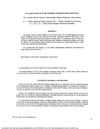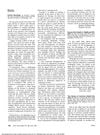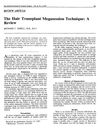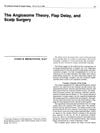 April 2020 in “Facial Plastic Surgery Clinics of North America”
April 2020 in “Facial Plastic Surgery Clinics of North America” In 2020, many new hair restoration treatments were developed, improving self-image and social interaction, with experts suggesting personalized treatment plans based on individual needs.
[object Object]  21 citations,
May 1976 in “Archives of Dermatology”
21 citations,
May 1976 in “Archives of Dermatology” Stopping fluoride toothpaste use might improve perioral dermatitis.
 20 citations,
August 2019 in “Journal of Telemedicine and Telecare”
20 citations,
August 2019 in “Journal of Telemedicine and Telecare” Dermatologists found teledermatology useful and confidence-boosting for diagnosing skin conditions, but faced limitations like technical issues and prescription restrictions. Despite this, they saw its potential to improve access to skin care, especially in remote areas.
 3 citations,
February 2016 in “Pediatric dermatology”
3 citations,
February 2016 in “Pediatric dermatology” Strong skin creams work well for long-term scalp inflammation in Rapp-Hodgkin Ectodermal Dysplasia.
165 citations,
July 1992 in “Annals of Internal Medicine” Herbal products can be dangerous and cause serious health issues.
 8 citations,
February 2003 in “Annals of Neurology”
8 citations,
February 2003 in “Annals of Neurology” Progesterone treatment improved seizures in a woman with menstrual cycle-related epilepsy, but a wrong medication worsened her condition.
 5 citations,
June 2021 in “JAAD Case Reports”
5 citations,
June 2021 in “JAAD Case Reports” Platelet-rich plasma therapy may help treat folliculitis decalvans but benefits might not last without ongoing treatment.
 September 2008 in “Fertility and Sterility”
September 2008 in “Fertility and Sterility” Greater intimacy leads to better self-reported health in couples having infertility treatment.
 32 citations,
April 2000 in “Dermatologic Clinics”
32 citations,
April 2000 in “Dermatologic Clinics” Skin diseases, especially psoriasis, greatly affect people's quality of life, similar to chronic diseases.
 3 citations,
December 2019 in “Journal of Cosmetic and Laser Therapy”
3 citations,
December 2019 in “Journal of Cosmetic and Laser Therapy” PRGF treatments increased hair number and thickness in people with hair loss, with more injections leading to better results.
16 citations,
November 1998 in “Fertility and sterility” Doctors used to view PCOS too narrowly, but now understand that insulin resistance is a key factor in the condition.
 October 1961 in “Archives of Dermatology”
October 1961 in “Archives of Dermatology” Reassurance is important for postpartum hair shedding as it likely won't cause complete baldness.
 July 1998 in “Proceedings of SPIE”
July 1998 in “Proceedings of SPIE” Low-power laser therapy is an effective, side-effect-free treatment that speeds up hair regrowth and crural ulcer healing.
 1 citations,
February 2010 in “Proceedings of SPIE”
1 citations,
February 2010 in “Proceedings of SPIE” Low level laser therapy may help regenerate hair cells in the ear after damage from gentamicin.
 155 citations,
September 2008 in “British journal of dermatology/British journal of dermatology, Supplement”
155 citations,
September 2008 in “British journal of dermatology/British journal of dermatology, Supplement” FFA is more common in postmenopausal women, can affect younger women, and may stabilize over time.
 June 1972 in “Archives of internal medicine”
June 1972 in “Archives of internal medicine” Androgens play a key role in hair growth.
 9 citations,
February 2016 in “Cambridge University Press eBooks”
9 citations,
February 2016 in “Cambridge University Press eBooks” The conclusion is that self-concept, shame, and emotion regulation are key factors in hoarding disorder, body dysmorphic disorder, and trichotillomania, and should be targeted in treatment and research.
 January 2014 in “Plastic and Aesthetic Research”
January 2014 in “Plastic and Aesthetic Research” Plastic surgery has constantly evolved, improving patient care and expanding techniques, especially after the World Wars.
 11 citations,
May 1976 in “Archives of Dermatology”
11 citations,
May 1976 in “Archives of Dermatology” Starving yourself can cause hair loss, but stopping the diet can improve it.
 January 2021 in “Erciyes medical journal”
January 2021 in “Erciyes medical journal” The COVID-19 pandemic changed the types of skin conditions seen at a clinic, with fewer patients and varying numbers of specific conditions.
 26 citations,
July 2019 in “JAAD Case Reports”
26 citations,
July 2019 in “JAAD Case Reports” Dupilumab for atopic dermatitis may cause new or worsen existing alopecia areata.
 3 citations,
July 2018 in “Cureus”
3 citations,
July 2018 in “Cureus” A breast cancer patient had lasting hair loss after chemotherapy, which improved with minoxidil treatment.
 2 citations,
January 2019 in “Elsevier eBooks”
2 citations,
January 2019 in “Elsevier eBooks” Biotin supplements are unnecessary for most people but may help with certain conditions like biotin deficiency, brittle nails, and some hair loss.
 15 citations,
May 2011 in “Veterinary Dermatology”
15 citations,
May 2011 in “Veterinary Dermatology” Vitamin A might be a safe extra treatment for dogs with sebaceous adenitis, but more research is needed to prove its effectiveness.
 June 2020 in “Aesthetic Surgery Journal”
June 2020 in “Aesthetic Surgery Journal” Estradiol-rich plasma can increase hair density faster and more effectively in male pattern baldness treatment than regular plasma.
[object Object]  2 citations,
June 1997 in “The American Journal of Cosmetic Surgery”
2 citations,
June 1997 in “The American Journal of Cosmetic Surgery” Hair transplant megasessions are safe up to 1500 grafts but larger sessions have more risks and challenges.
 December 1994 in “The American Journal of Cosmetic Surgery”
December 1994 in “The American Journal of Cosmetic Surgery” Understanding the scalp's blood flow and using delay techniques can improve the success of hair restoration surgeries.
 52 citations,
October 2004 in “Veterinary dermatology”
52 citations,
October 2004 in “Veterinary dermatology” Melatonin and mitotane treatment led to hair re-growth in 62% of dogs with Alopecia X, but this was not always linked to normal hormone levels.
 August 2014 in “Journal of clinical & experimental dermatology research”
August 2014 in “Journal of clinical & experimental dermatology research” Herbal stimulants in Cerita hair tonic can significantly reduce hair loss and the side effects of Minoxidil 1%.
April 2018 in “The journal of investigative dermatology/Journal of investigative dermatology” Interest in acne is rising, but research funding has significantly decreased.



























